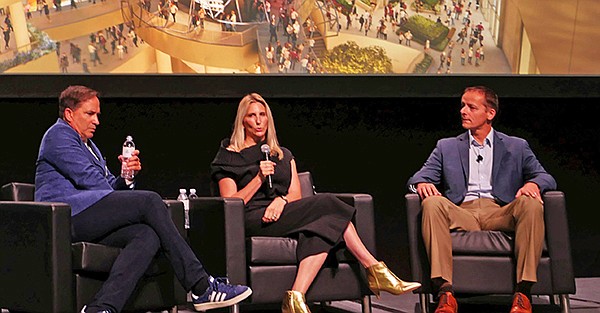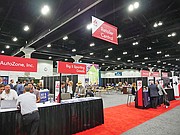RETAIL REAL ESTATE
Non Traditional Retail Marks Trends in Retail Real Estate
Representatives of some of the newest trends in retail took the stage at the International Council of Shopping Centers' Western Conference & Deal Making convention, which ran Sept. 16–18 at the Los Angeles Convention Center in the city’s downtown.
Speaking on the conference’s experiential-retail panel were Allison Samek, chief executive officer of Fred Segal, and Tony Sekora, director of real-estate development at Nordstrom Inc.
Samek said that the brand would build new stores overseas, a plan that was announced earlier this year when the retailer was acquired in March for an undisclosed amount by the brand-licensing agency Global Icons.
She also said that the shop’s stores planned to increase events produced at its local stores, such as its flagship in West Hollywood, Calif., and a shop in Malibu, Calif., which also opened in March.
Sekora said that a full-service Nordstrom department store in New York’s Columbus Circle and a Nordstrom Local location in the West Village will open in October following the opening of a Nordstrom Local store that was unveiled on the Upper East Side earlier this month. The Nordstrom Local concept made a splash when it was introduced in October 2017, but the spaces stock no inventory at the stores.
Sekora said that shoppers visiting Nordstrom Local—two of which are located in Los Angeles’ downtown and Brentwood sections—don’t go there to hang out. Rather, they visit for a talk with one of the shop’s stylists and also to make returns of garments that they purchased at Nordstrom.com or through other Nordstrom channels.
Quick returns help maintain the value of a garment when a retailer puts it back on the market, Sekora said. Long delays between a return and shipping a garment back to the store typically result in a decrease in value. “Speed is at the forefront of what we created,” he said.
The ICSC event also included panels on the cannabis business, coworking spaces, wellness studios and nontraditional, experiential retail. While traditional retail remains a serious player, new trends and tenants are reshaping retail streets and malls, said Chuck Dembo, a partner in the Beverly Hills, Calif.–headquartered Dembo Realty.
“More-established brands are not doing much,” Dembo said. “The question is, ‘Who, if anybody, is expanding?’ It’s not a lot of people, at least in the better markets.”
Nontraditional tenants are part of a new wave of growth charted in a research note released by the commercial-real-estate and advisory firm CBRE. Released in August, the research showed an increasing amount of retail real estate leased to companies that were described as focused on an industry that is included within the “5 Fs”—Fun, Furniture, Fitness, Food and Fashion.
“Expanding 5-F retailers have found new opportunities in spaces left behind by big-box chains,” the note said.
According to the research, this class of tenant had leased 36 million square feet of retail space in the Greater Los Angeles, Orange County and Inland Empire regions of Southern California. They increased their total leasing activity from 7.1 percent of leased commercial properties in 2009 to 23.6 percent of leased commercial properties in 2019, with 35 percent of total square feet occupied by the fashion category, which includes beauty and wellness.
Despite changes in the retail market, developers are more optimistic about opportunities in their field than in the recent past, according to a survey of developer sentiment performed by the UCLA Anderson School of Management in May. The market for industrial warehouses is booming across California, according to the survey, as is growth in the office-space market. An increase of office-anchored jobs is forecasted for the San Francisco Bay area, which will fuel demand for new office space in that region and Southern California.
The retail market is not forecasted to grow as quickly, but developers were more optimistic than they have been in the recent past, according to the survey. “[They] will see some improvement, and there will be more opportunities than at present,” the survey said.
Developers interviewed for the survey revealed there will be more opportunities for retail resulting from gentrification and the increasing density of urban areas. More opportunity will arise to lease commercial space from mixed-use developments, which include office, retail and dining in densely packed urban areas, said Derrick Moore, a senior vice president at CBRE, who led a panel discussion on “How to Negotiate Successful Leases.”
Putting together a deal is tougher than in the past, and tenants are looking for different amenities, Moore explained.
“The deal cycle is longer,” Moore said. “Deals are costing more for landlords. Tenants are requesting additional location-improvement dollars. They are also preferring to move into second-generation spaces.” These spaces have been improved by former tenants, allowing new tenants to forego financing renovations when they move in.
As retail real estate is changing, new commercial developments are also on the horizon. On Sept. 17, major tenants were announced for the upcoming Hollywood Park development in Inglewood, Calif. Cinépolis Cinemas will open a 12-screen movie house at the 300-acre mixed-use development, which will be anchored by a stadium the Los Angeles Rams and Los Angeles Chargers football teams will call home.
Working on the project is Andrew Turf, a CBRE senior vice president who served on a presentation panel covering Hollywood Park during the ICSC conference. He said that the development’s retail district will open in 2021, and fashion will be a part of the center.
“We’re building an authentic, soulful community for Los Angelenos and the city of Inglewood,” he said. “We’re trying to program it like a streetscape, not a mall.”
During ICSC, there were also discussions surrounding a 20 percent increase in coworking spaces at retail properties through 2023. Speaking on a panel was Dori Howard, co–chief executive officer of The Jane Club, which opened a flagship in Los Angeles’ Larchmont Village section in April. The space offers child-care classes and workout classes along with conference rooms and office space.
“These are community spaces,” Howard said of The Jane Club. “One of our core values is that we honor all work.”
























